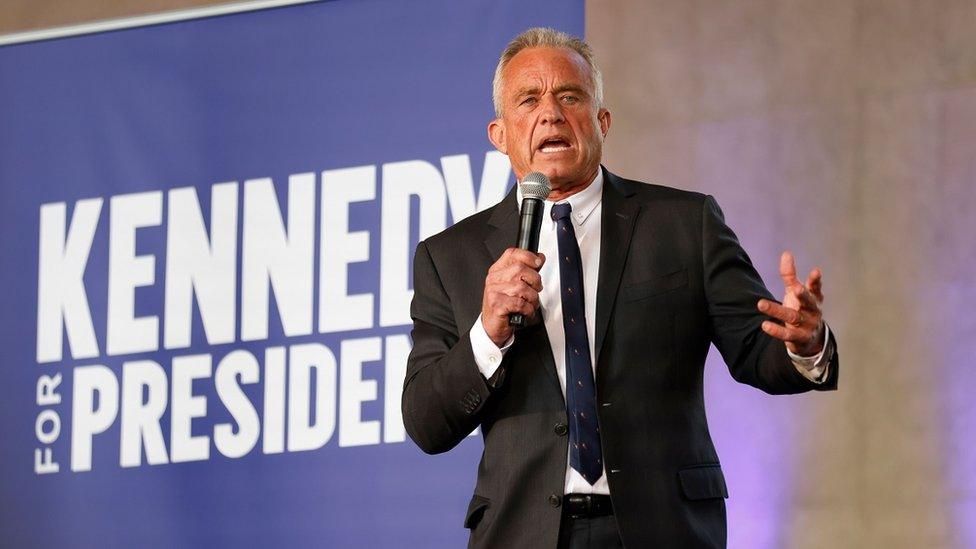RFK Jr in robust health despite brain worm scare, says campaign
- Published

Robert F Kennedy Jr on the campaign trail in California
US presidential candidate Robert F Kennedy Jr says he is in "robust health" following reports that he suffered from a brain parasite more than a decade ago.
The New York Times reported that Mr Kennedy also previously suffered from mercury poisoning and heart problems.
Mr Kennedy has made health a key part of his campaign.
He has contrasted his physical fitness with that of Joe Biden and Donald Trump.
"Questioning Mr Kennedy's health is a hilarious suggestion, given his competition," his campaign said in a statement Wednesday.
"Mr Kennedy travelled extensively in Africa, South America, and Asia in his work as an environmental advocate, and in one of those locations contracted a parasite," the campaign said.
"The issue was resolved more than 10 years ago, and he is in robust physical and mental health."
The New York Times report, based on a divorce deposition, said that in 2010 Mr Kennedy experienced severe memory loss and brain fog.
He sought treatment and said in the deposition two years later that a doctor told him the issues could be "caused by a worm that got into my brain and ate a portion of it and then died".
Worms do not eat brain tissue, experts say, but the idea is a non-medical or layman's understanding of what parasites might do if they enter the central nervous system.
Dr Philip Budge, an associate professor of infectious diseases at the Washington University School of Medicine in St Louis, said that parasite larvae can migrate to the brain and create cysts, in a condition known as neurocysticercosis.
"The cysts don't absorb any brain tissue, they simply create a space for the parasite to live," potentially pushing aside small parts of the brain, Dr Budge said.
"The cysts can occur in many places in the body. They usually don't cause any trouble unless they are in the brain," he said.
And the effects of brain parasites depend on where they end up: "It's like real estate: it's all about location location location."
"I'm unaware of any examples where a parasite affected cognition," said Dr Arnab Chatterjee, vice president of medicinal chemistry at the Center for Antiviral Medicines and Pandemic Preparedness in La Jolla, California.
Neither Dr Budge nor Dr Chatterjee have treated Mr Kennedy or have any specific knowledge of his health history.
However, Dr Chatterjee noted that another condition that RFK Jr reported suffering - mercury poisoning - does have a strong link to neurological problems.
In the deposition, Mr Kennedy also said he had elevated levels of mercury in his blood due to a diet heavy in tuna fish. He reduced his fish intake and underwent treatment for the condition.
After a career as an environmental lawyer, Mr Kennedy rose to prominence as the head of anti-vaccine organisation Children's Health Defense, formerly known as the World Mercury Project.
Mr Kennedy, 70, frequently talks about health on the campaign trail and has tried to contrast himself with Mr Biden, 81, and Mr Trump, 77.
However, the member of America's most famous political family has suffered from a variety of other health problems.

Last year Mr Kennedy posted a video of himself shirtless and doing push-ups
He is a former heroin addict and contracted hepatitis C from intravenous drug use, and has suffered from atrial fibrillation, a type of abnormal heartbeat.
The condition has put him in hospital at least four times, he told the New York Times, although he says has not had an episode for a decade.
He also has a noticeably strained, raspy voice caused by spasmodic dysphonia, a disorder that causes involuntary spasms in the muscles of the voice box.
On social media, he responded to the reports of his parasite by writing: "I offer to eat 5 more brain worms and still beat President Trump and President Biden in a debate."
Although Mr Kennedy is mounting the most popular third-party or independent challenge in decades and could swing the result, polls show him trailing far behind the front-runners.